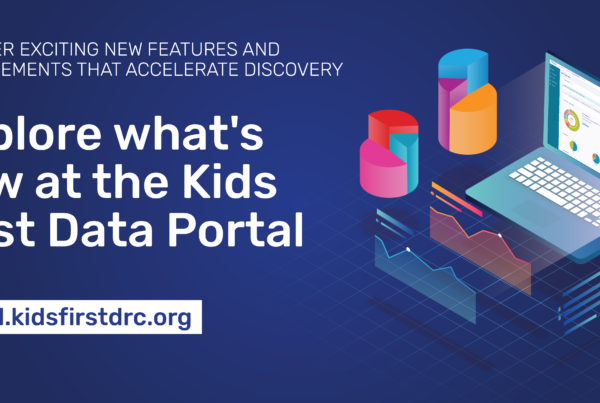The NIH Common Fund-supported Gabriella Miller Kids First Pediatric Research Program (Kids First Program), and the Kids First Data Resource Center (Kids First DRC) are driven by a desire to maximize the availability and use of clinical and multi-omic data to further the understanding of the genetic causes of and links between childhood cancers and structural birth defects.
Since launching the Kids First Data Resource Portal in September of 2018, The Kids First DRC has created a model for interoperability, collaborative research, and global accessibility of data that is helping to define what is possible for the scientific research community in service of advancing discoveries that can widely benefit the health and wellbeing of children and adults.
This summer, the Kids First DRC has maintained its position at the forefront of the national conversation around clinical and genomic data sharing by presenting at a number of gatherings of today’s leading minds in the fields of developmental biology and pediatric cancer research.
Among the events at which Kids First investigators shared their insights were the National Cancer Institute’s (NCI) Childhood Cancer Data Initiative (CCDI) Symposium in Washington, DC and the Society for Developmental Biology’s (SDB) 78th Annual Meeting, in Boston, MA; both held at the end of July.
Kids First DRC at the Childhood Cancer Data Initiative (CCDI) Symposium
The National Cancer Institute’s (NCI) Childhood Cancer Data Initiative (CCDI) Symposium was held from July 29 to 31 in Washington, DC, where scientific stakeholders and leaders from academia, government, industry, and advocacy organizations came together to gain a common understanding of the current issues and opportunities in childhood cancer research that can be addressed through enhanced data collection and maximum utilization of that data.
The CCDI is a proposed effort to further empower the collection, analysis, and sharing of data to address the burden of cancer in children, adolescents, and young adults (AYAs). The initiative aims to make it easier for researchers to learn from each of the approximately 16,000 children and adolescents diagnosed with cancer in the United States each year.
At the CCDI Symposium, Kids First Data Resource Center Principal Investigators Allison Heath, PhD and Adam Resnick, PhD presented posters to highlight the childhood cancer data currently available through the Kids First Data Resource Portal and the Pediatric Brain Tumor Atlas (PBTA) datasets, and also showcased the Kids First program’s achievements in building a cloud-based data analysis platform and infrastructure that drives collaborative research into childhood cancers and structural birth defects by appearing in panel discussions.
Dr. Heath presented how the Kids First DRC has built data analysis tools and platforms that are able to contribute toward the growth of an interoperable infrastructure of data sharing across the pediatric and adolescent/young adult (AYA) cancer and birth defects research landscape.
The Kids First DRC seeks to harness the potential of cloud-based collaborative research platforms that support FAIR data principles on behalf of empowering integration, use, and clinical translation of diverse, multi-disease, large-scale genomic and clinical datasets.
The Kids First Data Resource Portal provides for a secure, cloud-based platform that supports the ability of researchers to not only find, access, and reuse data, but also integrate, collaborate, and analyze data quickly and at scale. Recognizing the value in both original source data and the power of harmonized data for cross-disease analyses, the Kids First Data Resource Center supports the accessibility of data across the entire data life cycle for all cohorts in its platforms.
The Kids First DRC has implemented a set of core services, powered by Gen3, that ensure a foundation for interoperability with other large-scale NIH data sources and the NCI Data Commons Framework. This allows for participation in an emerging ecosystem of analysis and visualization applications that provide a highly diverse pediatric research community secure access to large-scale federated data via multi-environment user authentication.
The PBTA encompasses two datasets out of 13 currently available to the researcher community through the Kids First Data Resource Portal; with data provided by Kids First DRC partners the Children’s Brain Tumor Tissue Consortium (CBTTC) and the Pacific Pediatric Neuro-Oncology Consortium (PNOC). Through the presentation of a poster and remarks during a panel discussion at the CCDI Symposium, Dr. Resnick used the PBTA as an example of how collaborating researchers can build a centralized location for pediatric biospecimen-based data generation, paired with longitudinal clinical data curation and accelerated precision-based clinical trial design and implementation.
Together, PNOC and the CBTTC developed the PBTA as an open science initiative aimed at creating a first-in-kind multi-omic, comprehensive molecular and clinically rich dataset for brain tumors. The first dataset release of the PBTA includes over 30 brain tumor histologies representing from over 1,000 subjects. The data have been released pre-publication and without embargo, and have been made available via the Kids First Data Resource Portal and PedcBioPortal.
Over the past year, the PBTA and its associated data-sharing infrastructure has further served as an integration hub for disease specific efforts with a number of partnered initiatives and foundations, as well as the integration of data-driven initiatives across a continuum of research that includes both pediatric and adolescent and young adult patients, exemplified by the recently launched NCI-sponsored single-cell High-grade Glioma sequencing pilots, Project Hope and Project Care.
The combination of cloud-based analytic platforms with near real time large-scale data releases across a collaborative network defines a new paradigm for the acceleration of brain tumor research via collaborative discovery.
CCDI Symposium Posters:
“Gabriella Miller Kids First Pediatric Research Program (Kids First)”
Submitted on behalf of the NIH Gabriella Miller Kids First Working Group
“The Pediatric Brain Tumor Atlas: A Multi-Institution, Collaborative Pediatric and AYA Data Generation and Sharing Initiative to Accelerate Discovery and Clinical Translation”
; Submitted by Dr. Adam Resnick, PhD
“Gabriella Miller Kids First Data Resource Center: Collaborative Platforms for Accelerating Cross-Disease Pediatric Research Across Development and Cancer”
; Submitted by Dr. Allison Heath, PhD
CCDI Symposium Panel Discussions:
“Infrastructure to Enable Federation Among Pediatric Data Repositories”
; Dr. Allison Heath, PhD Presenting
“Creating Meaningful Datasets for Clinical Care and Associated Research Progress”
; Adam Resnick, PhD Presenting
Kids First DRC at the Society for Developmental Biology (SDB) Annual Meeting
At the 78th annual meeting of the Society for Developmental Biology in Boston, MA from July 26 to 30, the Kids First DRC presented an information table where event attendees were able to learn about specific disease cohort data available through the Data Resource Portal, and how to access this data to empower research. Also at the SDB Annual Meeting, Dr. Resnick gave a live technical tutorial of the Kids First Data Research Portal, where he discussed the available datasets, data access, and analytical tools of the Portal and again conveyed the importance of leveraging accessibility and interoperability of large-scale datasets
SDB is a non-profit professional society dedicated to the advancement of the field of developmental biology. Over recent decades, the SDB has grown from a few hundred members to nearly 2000, and has evolved to provide an international forum for research, education and career development in developmental biology.
SDB Presentation:
“The Gabriella Miller Kids First Data Resource Center: Leveraging Accessibility and Interoperability of Large-Scale Datasets”
; Adam Resnick, PhD, Presenting
SDB Poster Presentation:
“Gabriella Miller Kids First Pediatric Research Program (Kids First)”
; Submitted on behalf of the NIH Gabriella Miller Kids First Working Group










